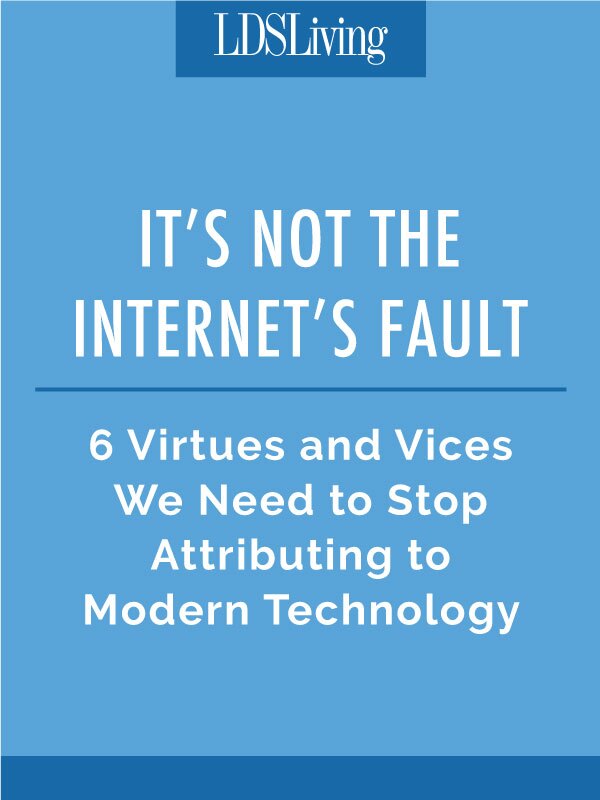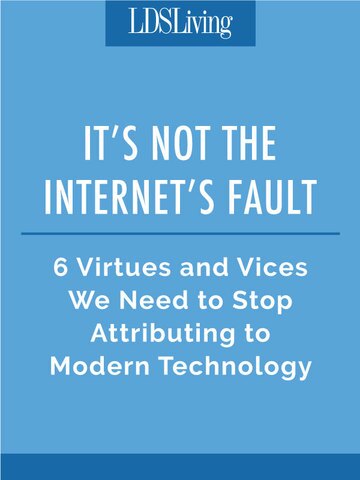
My first encounter with pornography was when I was about 9 years old. I was visiting my best friend who lived on a dude ranch. She always had more information than I did about the mysterious things of the world, and she told me that she knew that one of the employees on the ranch had a stack of magazines with pictures of naked ladies in it.
“Naked ladies?” I asked. “Why would anyone want to look at naked ladies?”
“I don’t know,” said my friend with a shrug. “Do you want to see them?”
“Sure!” I said.
It was not a simple task. We had to climb a mountain, break into a bunkhouse, and rummage through the cowboy’s personal belongings before we finally located the magazines. We perused the pages until we were sufficiently horrified. And then we left.
These days a child need not climb mountains or break into forbidden places to satisfy their curiosity. Now, all a curious child—or an adult—has to do is click. But even though the method of accessing pornography has simplified, the choice to seek it out has not changed.
Sometimes we like to blame the internet for our modern-day vices, but the internet is not at fault; it is how we decide to use the internet that really matters. Here are six virtues, and their opposing vices, that we need to stop blaming on modern technology:
Self-Esteem vs. Narcissism
We are children of God. We know we have a divine identity and we are raised to be confident, righteous followers of Christ. With social media, blogs, and websites, the internet has become an ideal place to express opinions, sell products, start businesses, or share ideas. It is a place where an “ordinary” person can find—or create—opportunities that before were limited. Now we have infinite ways to share faith-promoting comments, connect with friends, and find support from those who inspire and uplift.
Like all good things, however, the self-confidence created by the internet can be taken to an extreme. Never before have you been able to take 3,000 photos of your face in one day and post them for everyone to see. It is easy to begin dwelling on the number of likes we get or the number of times our post is shared (or not shared). We can begin using these powerful tools in a prideful way that only seeks to build our own image, not really help or inspire others.
We must be careful to avoid striving after the appearance of goodness or perfection and to seek them in their genuine form. When we get caught up too much in appearances, we actually begin forgetting our divine identity, basing our worth on the superficial, not the eternal.
Inspiration vs. Plagiarism
Often it is easier (and quicker) to google ideas than come up with creative solutions on our own or accept someone else’s answer rather than ponder questions for ourselves. The creative learning process can be tedious and time-consuming, but it is also a necessary and rewarding experience if you want truly original ideas and personal revelation
Often, even after brainstorming, comparing, researching, and theorizing, I come to a brick wall. I know there is something magnificent on the other side, if only I can get to it. I keep at it until finally a new, brilliant idea is flung over the wall and lands in my lap. These moments of pure knowledge make the work it takes to learn and think all worth it, because it gives me something new and personal to share with others. As members of the church we are blessed with having the inspiration of the Spirit. Though we can build off ideas we find online, we don’t need to steal ideas from others to spread our message. Don’t let the internet’s easy solutions take away your opportunity to continue expanding your mind and receiving your own spiritual inspiration.
Real Love vs. Virtual Love
Kazakhstan is one of the most remote countries in the world, yet when my husband was there on a business trip for an extended period of time, we were able to communicate often via the internet, and our relationship didn’t skip a beat.
The internet has given us unprecedented opportunities and methods to enhance our interactions with others, whether they be sitting next to us or on the other side of the world. However, when the internet is used as substitute for real people, it warps our ability to love.
Pornography is one of the greatest lies of the internet. It is well documented that having a pornography addiction not only changes the chemistry of the brain, but decreases the mutual satisfaction in relationships. It reinforces the idea that men and women must look a certain way to be desired, and that the worth of a person lies only in their sensuality. One could argue that pornography violates every single one of the Ten Commandments. It is vile in every form and shames the viewer, those who love the viewer, and those who are being viewed.
Conscious Charity vs. Blind Action
With the evolution of the internet, we have witnessed great acts of compassion only this medium could create. Remember the ice-bucket challenge for ALS that went so viral it overwhelmed Facebook (and the ALS Association's bank account)? We’ve also seen the Church’s Christmas and Easter campaigns encouraging us to reach out and remember the Savior and His children on earth. We’ve seen calls to action for humanitarian projects, individuals in our communities, and national disasters. Wherever there is a worthy cause, the internet has created a place for each of us to help in more ways that we ever could before.
These "calls to compassion" are exciting and effective. But sometimes when news breaks, social media is so quick to react it ignites. Often, we become too eager to jump on board and be a part of it all that we put in our two cents without taking time to adequately think through what is going on and what we are supporting. The pressure to produce split-second opinions so we don’t miss out can also mean we get things completely wrong.
This is herd mentality. We must carefully think through popular trends before joining the mob of snap judgements and criticism. We need to make sure that our support is contributing to good in the world and in line with our beliefs.
Faith vs. Popular Opinion
Before the internet, who would have thought the gospel could be spread so quickly and thoroughly to every part of the world? Yet, we have lived to see the fulfillment of Alma's wish:
1 O that I were an angel, and could have the wish of mine heart, that I might go forth and speak with the trump of God, with a voice to shake the earth, and cry repentance unto every people!
2 Yea, I would declare unto every soul, as with the voice of thunder, repentance and the plan of redemption, that they should repent and come unto our God, that there might not be more sorrow upon all the face of the earth.
We have access to an entire digital library of books, talks, scriptures, and materials on lds.org to help us in our quest for gospel knowledge or our efforts to do missionary work.
On the other hand, if we turn to social media to solve our deep doctrinal questions, we are submitting ourselves to an onslaught of opinion and hyperbole. It is tempting to turn to these sources, though, because the response is wonderfully immediate while the process of receiving revelation ourselves takes time and thought. We need to remember that using what we read from social media to replace what we know from the scriptures is like expecting a gourmet dinner from a fast food restaurant. It simply isn’t fulfilling in the long run.
Agency vs. Addiction
The internet has been a blessing in many ways, uniquely so to Latter-day Saints. As long as we are careful of the kinds of things we pursue and the amount and type of attention we give it, it can be a great tool in our lives for building our testimonies of the gospel.
As a personal example, I have had to learn to recognize when my use of the internet is turning into an addiction. A few months ago I realized I had been obsessively checking my Facebook updates and neglecting other things that were more important. I needed to change something. I couldn't unplug completely from social media. My excuses? I had a book to promote and family to connect with. So I made a compromise with myself: I couldn’t get on Facebook until I had read the scriptures. It was a simple, personal goal that I made many months ago and it has changed my life. It helps me keep a healthy gospel perspective and helps me discern the wisdom from the hype.
In the end, the internet always has the potential to be good or bad, because it gives us the power to always find what we are looking for. It all depends on what we choose to seek out. Paul and Joseph's teachings still ring true and should be a guide in all we do, including our internet use: If there is anything virtuous, lovely, or of good report or praiseworthy, we seek after these things.
For more from Chelsea Dyreng, check out her new novel, The Cenote, which addresses some of these important issues in an engaging, relevant way. Or, check out her blog, chelseadyreng.com.
Lead image via iStock.



